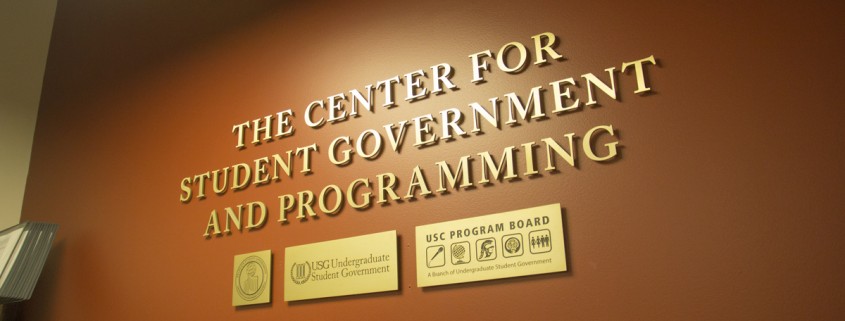USG considers bylaw changes for next year
At its weekly meeting Tuesday night, the Undergraduate Student Government Senate considered a corrective change to the USG bylaws and hearings to address complaints regarding appointments to positions throughout the organization.
After restructuring and streamlining USG for the next academic year, some officers realized that, in the new organization, they would not receive proper compensation. The Senate considered changing the bylaws to allow an increase in USG members’ stipends. A vote on these changes will take place during the next USG meeting.
Vice President Austin Dunn and Sen. Sabrina Enriquez described modifying the bylaws as a “loophole” to correct the error with compensation.
“This is meant as a Band-Aid because we did a restructure. [In the previous Senate], we didn’t anticipate that we would need a bylaw like this,” Enriquez said.
Other senators expressed concern about setting a poor precedent. Sen. Tyler Matheson asked about the amount of funding that would need to be increased to address stipend errors. Dunn and Enriquez dismissed those concerns.
“The budget is totally different this year than years past,” Dunn said. Dunn also said that budget hearings will be held over the weekend to determine how USG will allocate funding.
A move by Enriquez to limit the bylaw change only to the 2016-2017 school year passed unanimously. Sen. Daniel Newman’s move to vote on the bylaw change at this week’s meeting failed. The Senate will consider the matter again at next week’s meeting.
A large portion of the Senate meeting was spent discussing complaints regarding students who were appointed to Funding Board and other divisions of USG. They received emails from three different USG members who were upset with the appointment process.
“All the complaints have been … that the qualified person was not hired,” Lurie said. “The executive team is talking about how they can handle it and meet with those people and deal with all the complaints.”
Newman accepted the mistakes that were made with the appointments by USG and hopes to amend them for the future.
“I wanted to express my disappointment in the way that this was handled,” Newman said. “I know we can’t do anything now, but I hope that we can all learn from this.”
Some senators, including Lurie, expressed interest in attending the executives’ hearings with those who filed complaints. Dunn and USG Chief of Staff Jenny Di agreed to allow senators to sit in.
Lurie proposed that other USG members be allowed to sit in on the hearings so that senators could have “context” for what a good candidate for the position would be like, but Di said that letting other USG members attend the hearings would put them in an “uncomfortable position.”
“The priority is to address specific people who have specific complaints. … After these preliminary conversations are had, … I’m totally fine with looping in as many people as we need to,” Di said.
Dunn reiterated that although the executive board supported their appointments, they could have been more transparent with their appointments.
“Our executive team firmly and with totality stands behind the decisions that we made, with one exception, and that was the way it was presented to all of you,” Dunn said. “It made it seem like there was something to hide, and there wasn’t necessarily complete and total transparency. And the same way that you can’t take back your vote, we can’t take back the decision we made in that moment.”

